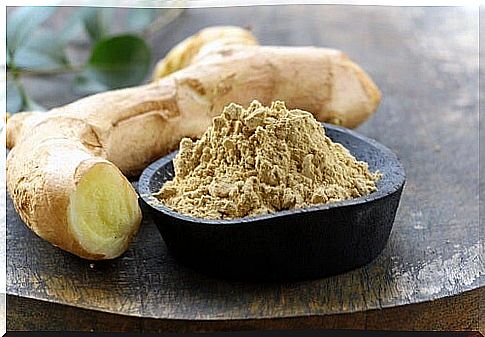Why Should We All Be Eating More Ginger?
Ginger is a good ally to alleviate certain symptoms of the cold, such as nasal congestion. But did you know that it also prevents nausea? Read on and discover everything about this root.

The ginger root that is most commercialized has its origin in China and Peru, and is highly valued at the gastronomic level thanks to its spicy flavor. Now why should we be eating more ginger?
Ginger is a food that has gained a lot of popularity and is increasingly present in different cuisines around the world. This, in part, is due to its versatility. It can be consumed in various ways (tea, capsules or raw) and in the most varied recipes.
But, beyond its culinary use, do you know its contributions to health?
Myths and facts about ginger
This study by a group of researchers from the Isfahan University of Medical Sciences (Iran) has shown that ginger contains anti-inflammatory properties.
These could help as a complement to the treatment already prescribed by the doctor, as long as the specialist authorizes their use. Some of the lesser known are:
To relieve nausea

According to this study carried out by a team from the Araba University Hospital (Spain), ginger could be a good complement when it comes to relieving nausea.
In the same way, and given its anti-inflammatory properties, it could also be ingested as an infusion to relieve stomach inflammation and related bloating, as well as flatulence.
Contains antioxidants and is an effective expectorant
According to this research carried out by a team of researchers from the University of Costa Rica, antioxidants play a very important role in preventing various diseases.
This is due to its fight against free radicals, guilty of the appearance of certain pathologies, such as cardiovascular ones.

Likewise, this root is also a good ally to alleviate some symptoms of flu and cold, such as nasal congestion.
Its expectorant properties help clear irritated airways, as stated in this study by a team from Columbia University (United States) .
Is it good for cholesterol?
For years, it has been believed that ginger could be beneficial in reducing cholesterol levels. However, new research, such as this one carried out by a team from the Shahid Beheshti University of Medical Sciences (Iran), assures that there is no correlation between its intake and the reduction of LDL cholesterol.
Due to the lack of conclusive data, it is best to consult a specialist first. Of course, it must be taken into account that this root should not be consumed in excess, since it can have side effects if it is combined with some medications.
Would eating more ginger ease a migraine?

Migraines occur when lipids called prostaglandins work by contracting and dilating blood vessels in the brain. When activated in excess, they cause them to swell and increase blood pressure, giving rise to that severe headache.
It is believed that ginger root could help combat this problem thanks to its ability to reduce the action of prostaglandins. However, the results to date are quite contradictory.
For example, this research carried out by a team from the University of Exeter (United Kingdom), recommends caution, since it does not consider that there is sufficient scientific evidence.
However, on the other hand, this study carried out by a team of researchers from the Zanjan University of Medical Sciences (Iran), ensures that ginger could mitigate migraine pain almost to the same level as sumatriptan.
When in doubt, it is always best to consult a doctor.
Does Eating More Ginger Help Control Diabetes?

As stated in this study carried out by a group of researchers from the University of Hoseo (South Korea), ginger could act as a supplement for the treatment of type 2 diabetes.
Therefore, some people should consider eating more ginger in a balanced diet. However, before consuming it, it is advisable to consult your doctor first, especially if you are taking any type of medication.
The need for a quality diet
Although it has been shown that ginger can act as an effective supplement in some ailments, it is important to maintain proper eating habits. This includes the daily intake of fruits and vegetables, proper hydration and the suppression, if possible, of ultra-processed foods with added sugars.
If you have any questions about it, it is best to see an endocrinologist. This will give the necessary guidelines for a quality diet and will answer any questions you may have.









